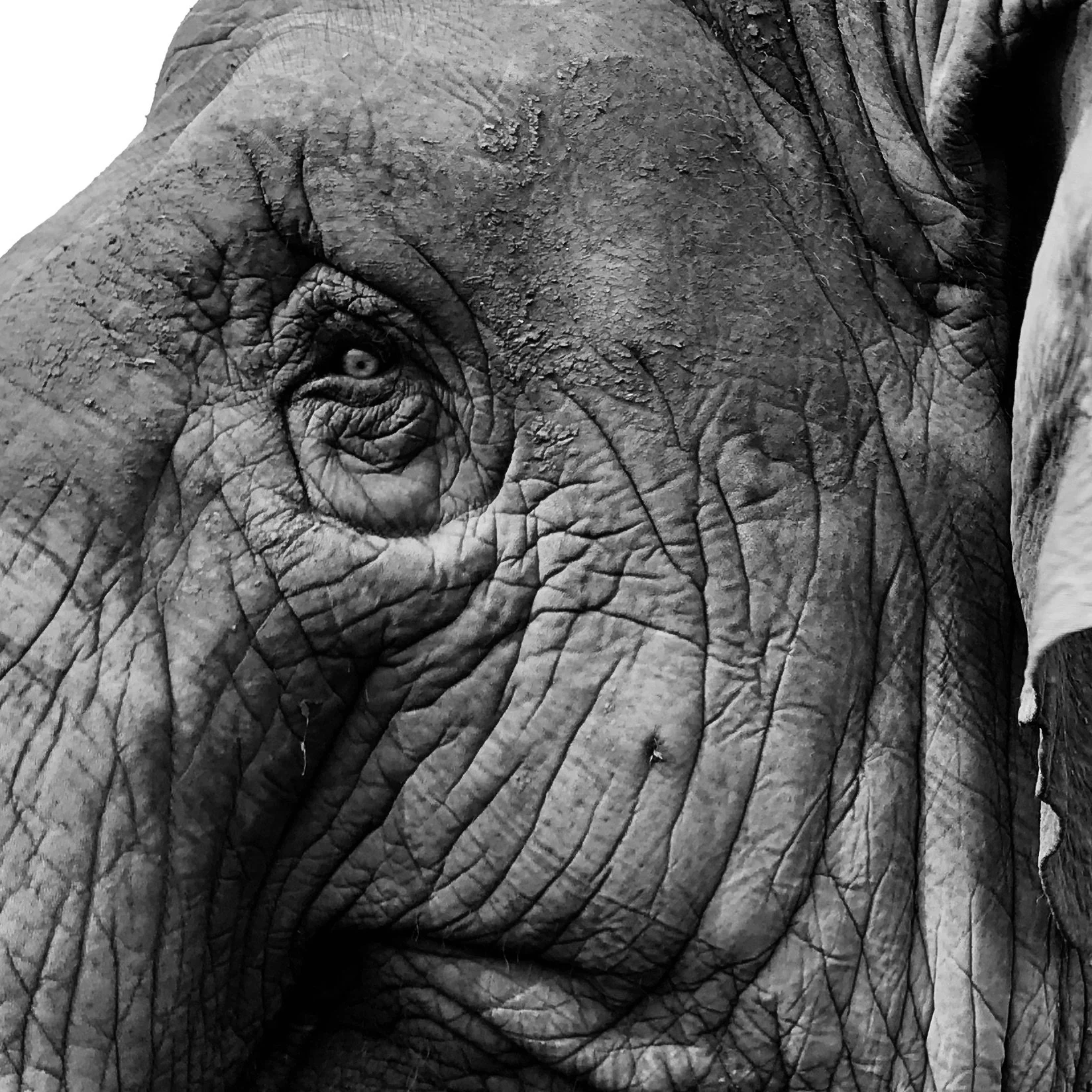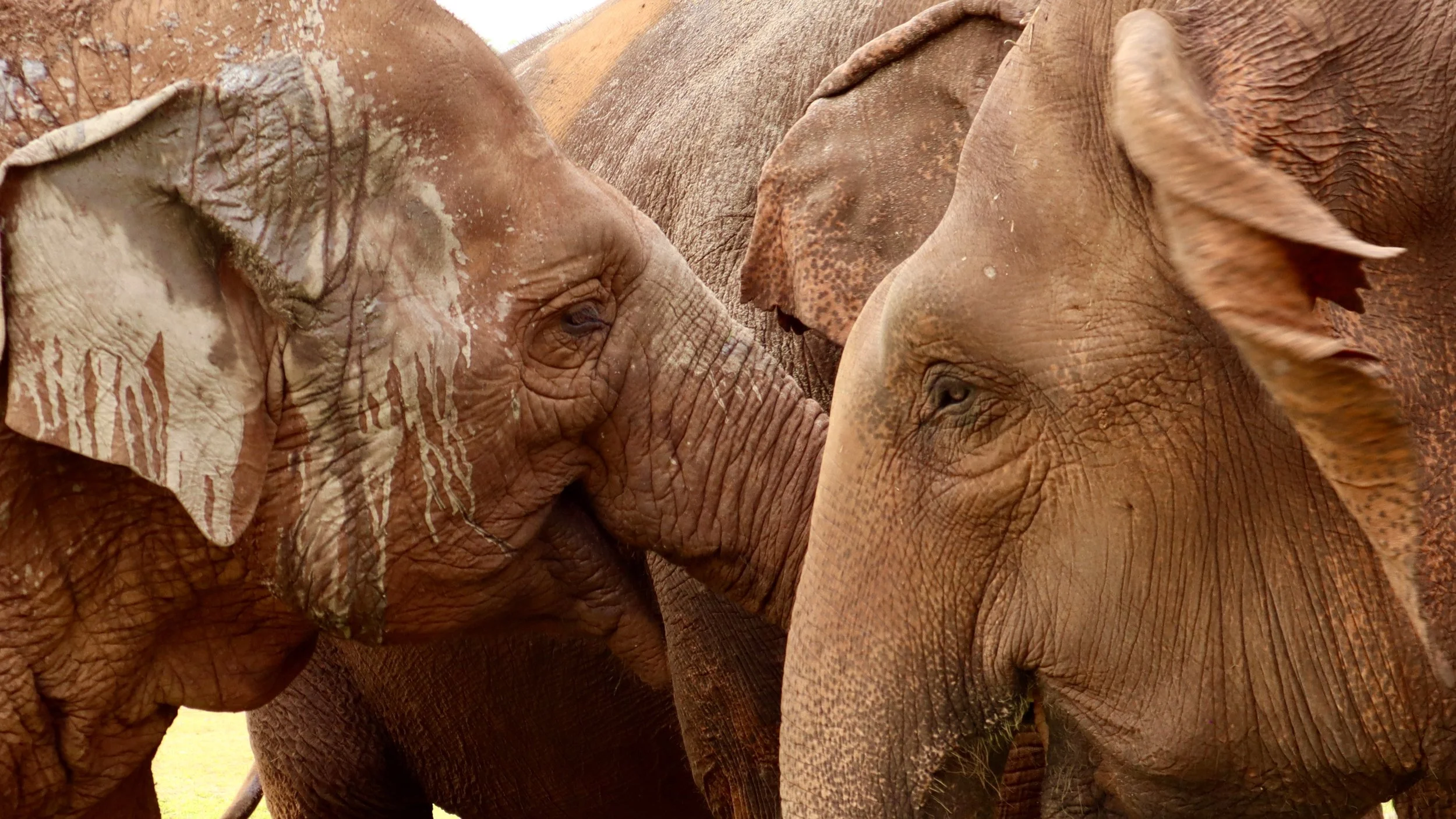<50,000
That’s how few Asian elephants remain.
The population of Asian elephants is currently estimated to be between 39,000 and 50,000 in the wild, with approximately 13,000 more in captivity*. Captive elephants are typically used for work, and frequently suffer from horrific abuse and exploitation.
You can help elephants like the beautiful Faa Mai here live the dignified life they deserve. By purchasing our digital cookbook, you contribute directly to Save Elephant Foundation (SEF), a registered Thai non-profit organisation. Every penny of the profits supports SEF’s efforts.
Find more information on SEF below, along with other ways to help protect these magnificent creatures.
*Source: The International Union for Conservation of Nature (IUCN) 2024.
A Home and a Future for Elephants
In 2019, we had the incredible opportunity to spend two weeks volunteering at Elephant Nature Park (ENP), an ethical elephant rescue and rehabilitation sanctuary in Northern Thailand.
During our time at ENP, we got to know some of the elephants and were inspired by the park’s remarkable story. Its founder, world-renowned elephant rights advocate, Saengduean Chailert (known by her nickname Lek), along with her husband Darrick and their dedicated team, have rescued dozens of elephants through Save Elephant Foundation (SEF). SEF is Lek’s overarching foundation supporting various projects, including ENP.
Founded in the 1990s, ENP is Asia’s first ethical sanctuary of its kind. It currently provides a loving home to over 100 elephants, most of whom were rescued from horrific situations. These elephants were previously forced to work in riding camps, circus shows, or as ‘entertainers’, enduring severe physical and psychological harm. ENP gives elephants a free and as close-to-natural home as possible, where they are loved and respected. Visitors and volunteers play a crucial role in healing their scars by sharing and supporting ENP's vital work.
Our volunteering experience at ENP crystallised our commitment to Asian elephant conservation. As a result, we became UK Ambassadors for Save Elephant Foundation (SEF). SEF supports Thailand’s captive elephant population through rescue and rehabilitation programs, educational ecotourism, local community outreach, and environmental conservation initiatives.
Scroll further down to learn why protecting both wild and captive Asian elephants is critical.
Discover more about our work at Act Big Live Small and as SEF Ambassadors here.
-
Dedicated to Protecting Asian Elephants
Save Elephant Foundation (SEF) is a Thai non–profit organisation founded by Saengduean ‘Lek’ Chailert and is the umbrella foundation for the various projects SEF supports, including Elephant Nature Park (ENP).
“Save Elephant Foundation is dedicated to providing care and assistance to Thailand’s captive elephant population through a multifaceted approach involving rescue and rehabilitation programs, educational ecotourism, local community outreach, and environmental conservation programs. The foundation exists thanks to the passion of Saengduean ‘Lek’ Chailert and her tireless efforts to champion the rights of elephants in Asia, along with all animals in need”.
-
“Elephant Nature Park (ENP) is an elephant rescue and rehabilitation centre in Northern Thailand, founded by renowned elephant rights advocate, Saengduean Chailert, known by her nickname Lek. It is the first ethical elephant sanctuary of its kind established in Asia and currently provides a caring home to over 100 elephants. Many of the elephants living in the sanctuary of Elephant Nature Park have been rescued by Save Elephant Foundation from street begging, elephant riding, and circus shows, where they often sustained both physical and psychological injuries. The park’s herds include blind, crippled, orphaned, and senior elephants who are now free to live a peaceful life in natural surroundings, where they are loved and respected”.
-
Saengduean Chailert, known by her nickname Lek, is the founder of Save Elephant Foundation and Elephant Nature Park.
Lek has worked tirelessly to raise international awareness about the plight of both captive and wild Asian elephants, and lives on the frontline of elephant conservation in Asia.
Articles
‘Meet the woman who's saving Asia's elephants '– Reader’s Digest, 17 August 2023
‘Ten female conservationists who have changed our relationship with nature’– BBC Wildlife, 4 May 2024. -
Follow the Journey: A Daring Rescue of a 70-Year-Old Elephant in Thailand
Actor/director Ashley Bell and a team of elephant rescuers led by world-renowned elephant rights advocate, Lek Chailert, embark on a daring mission 480 miles across Thailand to rescue Noi Na, a 70-year-old partially blind trekking elephant and bring her to freedom.
Website: Love & Bananas
Watch: Love & Bananas - Apple TV
Asian Elephant Conservation
A Critical Situation
The plight of African elephants is well-known and grim: Less than 415,000 remain. For Asian elephants, the situation is more dire by almost a factor of 10. The population of Asian elephants is currently estimated to be between 39,000 and 50,000 individuals in the wild. Approximately 13,000 more Asian elephants are captive*, frequently working as ‘service elephants’ and suffering from horrific abuse and exploitation.
*Source: The International Union for Conservation of Nature (IUCN).
For Asian elephants, working as a captive service elephant could mean:
Working in logging
Working in tourism (giving rides or performing for tourists or in circus shows)
Being part of ceremonies or religious festivals or working as temple elephants
Doing agricultural work or providing transport
Being held captive and forced to work means they are denied the highly complex social and physical environments that elephants require.
The Horrors of Pajan
What many people don’t realise is that working elephants go through a ‘breaking in’ practice called pajan, also called the crush box. Pajan is a barbaric process used to render an elephant docile. Elephant calves, sometimes as young as a year old, are taken from their mothers, isolated, put in a pen and chained and roped to prevent them from moving. They are deprived of water, food and sleep to speed up the ‘crushing’ process. Terrified, they are brutally, at times fatally, beaten with chains, clubs and bullhooks (a rod with sharp metal hooks on the striking end) and stabbed with knives and nails.
They are tortured this way, hour-after-hour, for up to 10 days to break their spirit.
Every single captive service elephant has been through some form of pajan.
The goal of pajan is 100% submission.
Life in Captivity
For most captive elephants, life involves:
Abuse and suffering
Fear and pain
Dehydration and malnutrition
Monotonous work far removed from their natural life
They spend a majority of their lives on a short chain which causes wounds and infections. They are often isolated - a torturous life for a herd animal. Complete obedience is enforced by bullhooks which they’ve been taught to fear due to the ruthless beating during pajan.
Threats to Asian Elephants Include:
Habitat loss and fragmentation
Human-elephant conflict
Poaching and illegal trade
Captivity and exploitation
Climate change
Our Goals
While we may not be able to solve every issue the Asian elephant currently faces, we can do everything in our power to help solve some. The two key areas where we’re focusing on influencing change are habitat loss and the exploitation of elephants in captivity.
Our Strategies
1. Educating Consumers:
Highlighting how the UK drives habitat destruction in Asia through the purchase of palm oil, found in many daily products.
We are currently compiling information on this issue and a list of products to avoid - please check back soon.
2. Raising Awareness & Providing Alternatives:
Raising awareness of the horrific abuse and exploitation most elephants working in captivity endure.
We are currently compiling information to help tourists choose ethical, elephant-friendly tourism options - please check back soon.
Who we choose to give our money to is powerful form of everyday activism.
Discover more about our work at Act Big Live Small and as SEF Ambassadors here.


